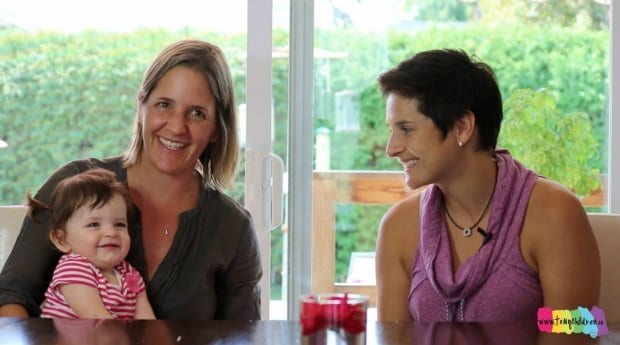While Republican candidates are deciding whether or not they’d attend a same-sex marriage:, one Montreal filmmaker is out to demonstrate what LGBT families look like.
As it turns out, they’re not so different from every other family.
In To My Children/À mes enfants, filmmaker George Karkour explores the dynamics of three LGBT families:
Monica Bastien, president of a trans help group, explores her transition and its effect on her children Danielle and Alexandre, who were pre-teens at the time; Armand Aalamian and Andre Langlois discuss their decision to use a surrogate as their daughters Nour and Ella-Joy bounce around their living room; and as baby Zoé blows kisses to the camera, Melissa David and Geneviève Lactot consider the weeks they have left before they have to send their child to daycare.
Karkour, who plans to be a father one day, wanted to understand the challenges faced by queer families.
“Where do we see LGBT families?” he says. “When was the last time you saw a same-sex couple holding a stroller?”
Growing up in Damascus, Karkour still surrounds himself with open-minded Syrians who, like him, had never met an LGBT family. In a sense, he says this film was a second coming-out.
While the film analyzes different family structures, Karkour regrets the lack of racial and class diversity among his subjects. There is also an absence of adolescent children.
This is when Robert Pilon comes in.
Pilon recently published Modèles Recherchés, a book about LGBT role models. It’s an extension of GRIS, a research group that has worked to challenge conceptions of homosexuality and bisexuality for 20 years in schools.
The book is a collection of testimonials and experiences of LGBT volunteers, and even a few Quebec celebrities like Xavier Dolan.
“Sexual minorities start to show ourselves and talk about what we live, not just coming out, but the aspects of our lives,” Pilon said. “There’s more to us — it’s not boring, but interesting and funny and touching.”
Faced with a lack of mandatory sex-ed in Quebec, To My Children and Modèles Recherchés both seek to provide insights of LGBT realities to young audiences.
“That’s a subject that [for] some teachers, either they are afraid to talk about it, or they don’t know how to talk about it, they don’t have the tools or the books,” Pilon says.
To that end, Karkour imagined his film would be a reference point for high school students. It’s available for free on YouTube, and has already been added to the curriculum of one college class.
Karkour’s film proves that sexual orientation has no influence on a person’s capacity to be a parent. To My Children breaks down ideas that children of LGBT families struggle more than hetero-families. The only differences found, as shown by studies, was that children from LGBT families had a greater tendency to experiment with sexual identity.
He hopes his film will represent the families that are often ignored by media. LGBT parents, he says, don’t exist in news coverage.
“I’m not expecting TV stations to be filled with LGBT people, but it should reflect the proportion in society,” he adds. “They’re non-existent.”

 Why you can trust Xtra
Why you can trust Xtra


